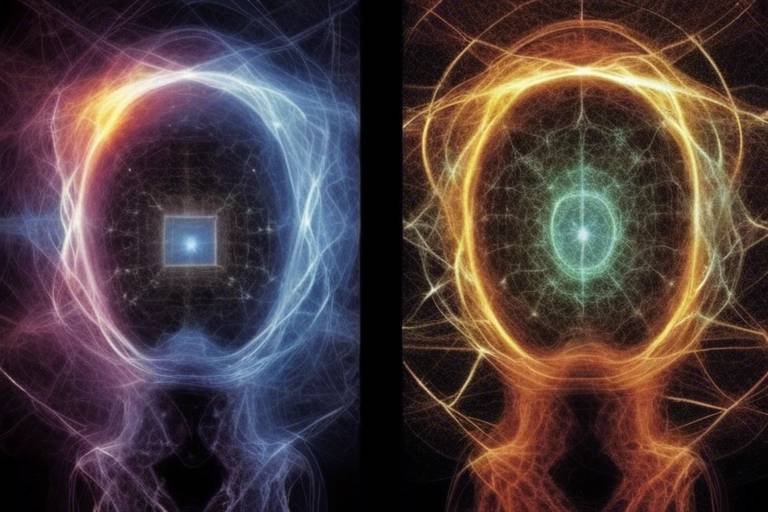Metaphysics and Quantum Physics - A Comparative Study
The relationship between metaphysics and quantum physics is nothing short of fascinating. As we delve into this comparative study, we find ourselves at the crossroads of two disciplines that, on the surface, seem worlds apart. Yet, they share a profound connection in their quest to understand the very fabric of reality. Metaphysics, a branch of philosophy, seeks to explore questions about existence, the nature of being, and the universe itself, while quantum physics, a cornerstone of modern science, investigates the behavior of matter and energy at the tiniest scales. Together, they challenge our perceptions and invite us to reconsider what we think we know about the universe.
Imagine standing on the edge of a vast ocean, where the waves represent the mysteries of existence. Metaphysics dives deep into the depths of this ocean, seeking answers to questions that often elude empirical observation. It grapples with concepts like time, space, causality, and the essence of reality itself. On the other hand, quantum physics is like the rippling surface of the water, revealing the chaotic and unpredictable nature of the particles that make up everything around us. The interplay between these two fields sparks a dialogue that can lead to profound insights about our reality.
At the heart of this study lies the understanding that both metaphysics and quantum physics challenge our traditional views. For instance, consider the concept of determinism. Classical physics operates under the assumption that the universe is predictable, that given enough information, one can forecast the future with absolute certainty. However, quantum physics introduces a level of indeterminacy that shakes this foundation. Particles do not behave in a straightforward manner; instead, they exist in a state of probability until observed. This notion raises significant philosophical questions about the nature of reality and our role as observers.
Furthermore, the implications of quantum phenomena, such as superposition and entanglement, echo through the corridors of metaphysical thought. These concepts suggest that particles can exist in multiple states at once or be instantaneously connected across vast distances, challenging our understanding of space and time. Metaphysics and quantum physics converge in their exploration of these ideas, prompting us to reconsider the very nature of existence and the relationship between consciousness and reality.
As we navigate through this comparative study, it becomes clear that both fields offer unique perspectives on the questions that define our existence. They invite us to ponder the interconnectedness of all things and the profound mysteries that lie beyond our immediate perception. In this light, metaphysics and quantum physics are not merely academic disciplines; they are pathways to deeper understanding, urging us to explore the unknown and embrace the complexities of reality.
- What is metaphysics? Metaphysics is a branch of philosophy focused on understanding the fundamental nature of reality, existence, and the universe.
- How does quantum physics differ from classical physics? Quantum physics explores the behavior of matter and energy at the smallest scales, introducing concepts like superposition and entanglement, which challenge classical notions of predictability.
- What is wave-particle duality? Wave-particle duality refers to the phenomenon where particles exhibit both wave-like and particle-like properties depending on the observational context.
- How do metaphysics and quantum physics intersect? Both fields explore the nature of existence and reality, raising questions about consciousness, the observer effect, and the implications for free will.

Understanding Metaphysics
Metaphysics, at its core, is a fascinating branch of philosophy that dives deep into the questions of existence, reality, and the universe itself. Imagine it as the ultimate quest for understanding the "why" behind everything that exists. While science often focuses on "how" things work, metaphysics takes a step back and asks, "What is the nature of reality?" This exploration transcends empirical observation and scientific inquiry, pushing the boundaries of our understanding.
One of the intriguing aspects of metaphysics is its ability to tackle concepts that are often intangible or abstract. It seeks to answer profound questions such as:
- What is the nature of being?
- Do we have free will, or is everything predetermined?
- What is the relationship between mind and matter?
- Is there a purpose to existence?
These questions open a Pandora's box of philosophical discussions that have persisted for centuries. The beauty of metaphysics lies in its capacity to intertwine with various disciplines, including science, theology, and ethics. For instance, when we consider the nature of time and space, metaphysical inquiries can lead to discussions that challenge our conventional understanding of the universe. It's like trying to solve a puzzle where the pieces keep changing shape!
Metaphysics can be divided into several key areas, each exploring different aspects of existence. These include:
- Ontology: The study of being and existence.
- Cosmology: The study of the universe and its origins.
- Epistemology: The study of knowledge and belief.
- Metaphysics of Mind: The exploration of consciousness and its relation to the physical world.
As we delve deeper into these areas, we begin to see how metaphysics not only questions our understanding of reality but also challenges our perceptions of what it means to exist. It invites us to ponder the interconnectedness of all things, urging us to consider whether there is more to life than what meets the eye.
In essence, metaphysics serves as a bridge between the known and the unknown, the tangible and the abstract. It encourages us to explore the profound mysteries of existence, much like a detective piecing together clues in a grand cosmic mystery. As we navigate this philosophical landscape, we realize that metaphysics is not just an academic pursuit; it's a journey into the very fabric of our being.
So, as we continue to unravel the threads of metaphysical inquiry, we find ourselves asking not only what exists but also why it matters. This exploration sets the stage for a deeper understanding of how metaphysics and quantum physics intersect, shaping our perception of reality in ways we are only beginning to comprehend.

Basics of Quantum Physics
Quantum physics, often referred to as quantum mechanics, is a fascinating field that dives deep into the behavior of matter and energy at the most fundamental levels. Imagine a world where particles can exist in multiple states at once, or where two particles can be connected in such a way that the state of one instantly influences the other, regardless of the distance separating them. This is not science fiction; it's the reality of quantum physics! The principles of this discipline challenge everything we thought we knew about the universe, pushing the boundaries of classical physics and opening up a realm of possibilities that can seem almost magical.
One of the most captivating aspects of quantum physics is its departure from the deterministic views held by classical physics. In classical mechanics, if you know the initial conditions of a system, you can predict its future behavior with absolute certainty. However, quantum mechanics introduces a level of unpredictability that can leave even the most seasoned scientists scratching their heads. Instead of deterministic outcomes, we are faced with probabilities. For instance, when you observe an electron, you can only predict the likelihood of finding it in a specific location, rather than knowing precisely where it is at any given moment.
To grasp the basics of quantum physics, it's essential to understand some of its key principles. Here are a few that stand out:
- Wave-Particle Duality: Particles, such as electrons and photons, exhibit both wave-like and particle-like properties. Depending on how we observe them, they can behave like waves, spreading out over space, or like particles, localized in specific points.
- Superposition: This principle states that a quantum system can exist in multiple states simultaneously until it is measured. Think of it like a spinning coin; it's not just heads or tails until you catch it!
- Entanglement: When particles become entangled, the state of one particle is directly related to the state of another, no matter how far apart they are. This bizarre connection has led to discussions about "spooky action at a distance."
- The Uncertainty Principle: Proposed by Werner Heisenberg, this principle asserts that certain pairs of physical properties, like position and momentum, cannot be known with absolute precision at the same time, introducing a fundamental limit to our measurements.
These principles not only redefine our understanding of the universe but also pose intriguing philosophical questions. For instance, if particles can exist in multiple states, what does that mean for our perception of reality? Are we merely observers in a universe that is constantly in flux? The implications of quantum physics stretch far beyond the laboratory; they invite us to reconsider our assumptions about existence, knowledge, and the very fabric of reality itself.
In summary, quantum physics is not just a study of the microscopic world; it's a gateway to understanding the underlying principles that govern everything around us. As we peel back the layers of this complex field, we continue to uncover the astonishing ways in which the universe operates, challenging our perceptions and expanding our horizons.

Key Principles of Quantum Mechanics
Quantum mechanics, often described as the strange and mysterious realm of physics, reveals a world that defies our everyday experiences. At the heart of this fascinating domain are several key principles that challenge our understanding of reality. These principles not only reshape our view of the universe but also provoke profound philosophical questions about the nature of existence itself.
One of the most intriguing concepts in quantum mechanics is wave-particle duality. This principle posits that particles, such as electrons and photons, can exhibit both wave-like and particle-like properties depending on how they are observed. Imagine a coin that can show heads or tails based on whether you look at it or not; in the quantum world, the act of observation plays a crucial role in determining a particle's state. This duality is fundamental in understanding phenomena like interference patterns, which can only be explained when considering the wave nature of particles.
Another cornerstone of quantum mechanics is the uncertainty principle, formulated by the physicist Werner Heisenberg. This principle states that certain pairs of physical properties, like position and momentum, cannot be simultaneously measured with arbitrary precision. To put it simply, the more accurately we know a particle's position, the less accurately we can know its momentum, and vice versa. This inherent limitation challenges the classical notion of determinism, suggesting that at a fundamental level, the universe is governed by probabilities rather than certainties.
To better illustrate these principles, consider the following table that summarizes some of the key concepts in quantum mechanics:
| Principle | Description |
|---|---|
| Wave-Particle Duality | Particles can behave as both waves and particles depending on observation. |
| Uncertainty Principle | Limits the precision of simultaneous measurements of certain pairs of properties. |
| Quantum Superposition | Particles can exist in multiple states at once until measured. |
| Quantum Entanglement | Particles can become correlated in such a way that the state of one instantly influences the state of another, regardless of distance. |
Additionally, the principle of quantum superposition suggests that particles can exist in multiple states at once until an observation is made. It’s as if a musician could play multiple notes simultaneously, creating a symphony of possibilities. Only when a measurement occurs does the particle 'choose' a specific state, collapsing the wave function into a definite outcome. This concept not only deepens our understanding of quantum behavior but also raises questions about the nature of reality itself.
Lastly, we have quantum entanglement, a phenomenon where particles become intertwined in such a way that the state of one particle is immediately linked to the state of another, no matter how far apart they are. This bizarre connection has led to the idea of "spooky action at a distance," a term coined by Albert Einstein, who was famously skeptical of the implications of quantum mechanics. Entanglement challenges our understanding of locality and has profound implications for the nature of information and communication in the quantum realm.
In summary, the key principles of quantum mechanics not only redefine our understanding of the microscopic world but also challenge our philosophical perspectives on reality, existence, and the very nature of knowledge. As we continue to explore these principles, we find ourselves standing at the crossroads of science and philosophy, where the mysteries of the universe beckon us to delve deeper.
- What is quantum mechanics? Quantum mechanics is a fundamental theory in physics that describes the behavior of matter and energy at the smallest scales, such as atoms and subatomic particles.
- How does wave-particle duality work? Wave-particle duality suggests that particles can behave both as waves and as particles, depending on how they are observed. This means their behavior can change based on measurement.
- What is the uncertainty principle? The uncertainty principle states that certain pairs of physical properties, like position and momentum, cannot both be known to arbitrary precision at the same time.
- What is quantum entanglement? Quantum entanglement is a phenomenon where two or more particles become correlated in such a way that the state of one particle instantly affects the state of another, regardless of the distance between them.

Wave-Particle Duality Explained
Wave-particle duality is one of the most fascinating and perplexing concepts in quantum physics. Imagine for a moment that you’re at a concert, and the sound waves from the band create a rich tapestry of music that fills the air. Now, think about how those same sound waves can be represented as particles when they hit your eardrum. This dual nature is not just a quirky feature of sound; it reflects a fundamental truth about the universe at a quantum level.
In essence, wave-particle duality suggests that particles, such as electrons and photons, can behave both as discrete particles and as waves, depending on how we observe them. This means that the very act of observation influences the behavior of these particles. When we look closely at an electron, it behaves like a particle, with a defined position. However, when we’re not observing it, it acts like a wave, existing in a state of probability, spreading out across space.
To illustrate this concept, consider the famous double-slit experiment. When light or electrons are fired at a barrier with two slits, and we don't observe which slit they pass through, they create an interference pattern on a screen behind the barrier—indicative of wave behavior. However, when we set up a measurement to determine which slit the particle goes through, the interference pattern disappears, and particles behave as if they had traveled through one slit or the other. This experiment raises profound questions about the nature of reality and the role of the observer.
The implications of wave-particle duality extend beyond just physics; they touch upon the very essence of existence and our understanding of reality. If particles can exist in multiple states simultaneously until observed, what does that say about our perception of the world around us? Are we merely observers in a universe that behaves according to our expectations? Or is there a deeper, underlying reality that we have yet to comprehend?
In summary, wave-particle duality challenges our traditional understanding of matter and energy. It forces us to reconsider our notions of reality, existence, and the nature of observation itself. This duality is not just a scientific curiosity; it is a gateway into the philosophical inquiries that have intrigued humanity for centuries.
- What is wave-particle duality? Wave-particle duality refers to the phenomenon where particles like electrons and photons exhibit both wave-like and particle-like properties depending on the observational context.
- How does the double-slit experiment demonstrate wave-particle duality? The double-slit experiment shows that particles create an interference pattern when not observed, indicating wave behavior, but behave like particles when their path is measured.
- What are the implications of wave-particle duality? It raises questions about the nature of reality, the role of the observer, and challenges our traditional views of determinism and predictability in physics.

The Uncertainty Principle
The Uncertainty Principle, formulated by Werner Heisenberg in 1927, is one of the cornerstones of quantum mechanics. It asserts that certain pairs of physical properties, like position and momentum, cannot be simultaneously measured with arbitrary precision. This isn't just a limitation of our measuring instruments; it's a fundamental property of nature itself. Imagine trying to pinpoint the exact location of a moving car while also trying to determine its speed. The more accurately you measure one, the less accurately you can measure the other. This principle challenges our classical intuitions about predictability and determinism in the physical world.
To illustrate this concept further, consider the following table that summarizes the key aspects of the Uncertainty Principle:
| Property | Description |
|---|---|
| Position (x) | The exact location of a particle in space. |
| Momentum (p) | The product of the mass and velocity of a particle. |
| Uncertainty (Δx) | The range of possible values for position. |
| Uncertainty (Δp) | The range of possible values for momentum. |
This principle raises profound philosophical questions about the nature of reality and our understanding of it. If we cannot know both the position and momentum of a particle with certainty, what does that say about the predictability of the universe? Are we living in a world governed by strict laws, or is there an inherent randomness that shapes our reality? The Uncertainty Principle suggests that at the quantum level, the universe is not as deterministic as we once believed.
Moreover, the implications of this principle extend beyond physics into the realm of metaphysics. It invites us to ponder the very nature of existence and knowledge. If our observations influence the state of a quantum system, can we truly claim to understand reality? This interplay between measurement and reality challenges the traditional philosophical views that have dominated Western thought for centuries.
In essence, the Uncertainty Principle compels us to reconsider our assumptions about the universe. It highlights the limitations of our understanding and the role of the observer in shaping reality. As we delve deeper into the mysteries of quantum mechanics, we find ourselves at the intersection of science and philosophy, where questions about the nature of existence and the limits of human knowledge collide.
- What is the Uncertainty Principle? The Uncertainty Principle states that certain pairs of physical properties, like position and momentum, cannot be known simultaneously with arbitrary precision.
- Who formulated the Uncertainty Principle? The principle was formulated by physicist Werner Heisenberg in 1927.
- What are the implications of the Uncertainty Principle? It challenges the classical notions of determinism and predictability, suggesting that at the quantum level, the universe is inherently uncertain.
- How does the Uncertainty Principle relate to metaphysics? It raises philosophical questions about the nature of reality, knowledge, and the role of the observer in shaping physical phenomena.

Philosophical Implications of Quantum Physics
The realm of quantum physics is not just a playground for physicists; it also serves as a profound philosophical landscape that challenges our understanding of reality. As we delve into the strange and often counterintuitive findings of quantum mechanics, we are compelled to confront questions that go beyond the physical and touch upon the very essence of existence. For instance, one of the most captivating philosophical inquiries arising from quantum physics is the nature of reality itself. Are we merely observers in a universe that exists independently of us, or does our consciousness play a pivotal role in shaping the reality we perceive?
Moreover, the concept of the observer effect raises intriguing questions about the relationship between consciousness and the physical world. In quantum mechanics, the act of observation can influence the state of a particle, implying that our awareness might have a tangible impact on the universe. This revelation invites us to reconsider traditional metaphysical assumptions that separate mind from matter, suggesting instead that consciousness could be an integral part of the fabric of reality.
Another philosophical implication of quantum physics is the challenge it poses to the classical notion of determinism. In classical physics, the universe operates like a well-oiled machine, where every event is determined by preceding causes. However, quantum mechanics introduces a level of indeterminacy that suggests not everything is predetermined. This raises the question: if events can occur without a deterministic cause, does this open the door to the concept of free will? The implications of this are profound, as they challenge long-held beliefs about human agency and responsibility.
To illustrate these philosophical implications further, consider the following table that summarizes key concepts:
| Concept | Description |
|---|---|
| Observer Effect | The phenomenon where the act of observation alters the state of a quantum system. |
| Indeterminacy | The idea that not all events are predetermined, allowing for randomness in quantum events. |
| Free Will | The philosophical debate on whether individuals can exercise control over their actions in a potentially random universe. |
In essence, the philosophical implications of quantum physics extend far beyond abstract theories; they invite us to engage in a deeper exploration of our place in the universe. As we grapple with these ideas, we are reminded that the boundaries between science and philosophy are not as rigid as they might seem. Instead, they intertwine in a dance that encourages us to question our assumptions and expand our understanding of existence.
- What is the observer effect in quantum physics? The observer effect refers to changes that the act of observation can make on a quantum system, suggesting that consciousness might influence reality.
- How does quantum physics challenge determinism? Quantum physics introduces indeterminacy, implying that not all events are predetermined, which raises questions about free will.
- What role does consciousness play in quantum mechanics? Consciousness may play a crucial role in shaping the reality we experience, as suggested by the observer effect and other quantum phenomena.

Intersecting Concepts
The fascinating interplay between metaphysics and quantum physics offers a unique lens through which we can examine the nature of existence and reality itself. Both fields, while distinct in their approaches, converge on significant questions that challenge our understanding of the universe. For instance, consider the age-old philosophical query: "What is real?" Metaphysics seeks to answer this through abstract reasoning and theoretical frameworks, while quantum physics approaches it through empirical observation and mathematical modeling. This intersection encourages us to delve deeper into how our perception shapes the physical world around us.
One of the most intriguing aspects of this relationship is the role of consciousness. In quantum physics, the observer effect suggests that the act of observation can influence the behavior of particles. This idea resonates with metaphysical discussions about the nature of reality—if our consciousness can affect physical phenomena, then what does that say about the fabric of existence? Are we mere spectators in a deterministic universe, or do we play an active role in shaping it? This question not only blurs the lines between science and philosophy but also invites us to reconsider our assumptions about the universe.
Moreover, the debate surrounding determinism and free will adds another layer to this intricate relationship. Traditional metaphysical views often lean towards a deterministic framework, where every event is the result of preceding causes. However, the indeterminate nature of quantum mechanics introduces a level of unpredictability that challenges this notion. Could it be that quantum indeterminacy provides a scientific basis for the existence of free will? This idea is not just a philosophical musing; it has real implications for how we understand our choices and responsibilities in life.
In summary, the intersection of metaphysics and quantum physics is a rich field of inquiry that prompts us to question the very essence of reality. By exploring these concepts, we can gain a deeper understanding of how consciousness, observation, and the fundamental nature of existence intertwine. As we continue to investigate these profound questions, we may find that the answers lie not only in the realms of science and philosophy but also within the very fabric of our own consciousness.
- What is the main difference between metaphysics and quantum physics?
Metaphysics is a philosophical inquiry into the nature of reality and existence, while quantum physics is a scientific study of matter and energy at the smallest scales. - How does consciousness relate to quantum physics?
The observer effect in quantum physics suggests that the act of observation can influence the behavior of particles, raising questions about the role of consciousness in shaping reality. - Does quantum physics support the idea of free will?
Quantum indeterminacy introduces unpredictability, which some argue could provide a basis for free will, challenging traditional deterministic views.

Consciousness and Reality
When we delve into the relationship between consciousness and reality, we step into a fascinating realm where philosophy meets quantum physics. Imagine consciousness as the lens through which we perceive the universe, shaping our understanding of what is real. This perspective raises profound questions: Does our awareness influence the physical world around us? Can our thoughts alter the fabric of reality itself? These inquiries are not just theoretical; they challenge us to reconsider the very nature of existence.
At the heart of this discussion lies the observer effect, a concept in quantum physics suggesting that the act of observation can change the state of a quantum system. Picture a scenario where a particle exists in multiple states simultaneously—until we measure it. The moment we observe, it collapses into one specific state. This phenomenon tantalizingly hints at a connection between our consciousness and the reality we experience. Could it be that our awareness plays a pivotal role in shaping the universe as we know it?
To further explore this intricate relationship, let’s consider some key ideas:
- Subjective Experience: Our individual perceptions create a unique reality for each person. What one person sees as beautiful, another may find mundane. This subjectivity suggests that reality is not a fixed entity but rather a tapestry woven from countless personal experiences.
- Collective Consciousness: Some theorists propose that humanity shares a collective consciousness, influencing reality on a larger scale. This idea resonates with concepts found in metaphysics, where the interconnectedness of all beings plays a crucial role in shaping the universe.
- Quantum Entanglement: This phenomenon illustrates how particles can become interconnected, regardless of distance. It prompts us to ponder whether our consciousness could also be entangled, affecting one another in ways we have yet to fully understand.
In essence, the relationship between consciousness and reality is a dance of perception and existence. As we continue to explore the depths of quantum physics, we may uncover insights that bridge the gap between these two realms. Are we merely observers of a predetermined universe, or do we hold the power to shape it through our awareness? The answers may lie in the interplay of consciousness and reality, inviting us to expand our understanding of both.
- What is the observer effect in quantum physics?
The observer effect refers to changes that the act of observation can make on a quantum system, suggesting that consciousness might influence physical reality. - How does consciousness relate to metaphysics?
Consciousness is a central theme in metaphysics, which seeks to understand the nature of reality and existence, raising questions about how our awareness shapes the universe. - Can our thoughts influence reality?
While this is still a topic of debate, quantum physics suggests that consciousness and observation may play a role in shaping physical outcomes.

Determinism vs. Free Will
The age-old debate between determinism and free will has taken on new dimensions with the advent of quantum mechanics. Traditionally, determinism asserts that every event or state of affairs, including human actions, is the result of preceding events in accordance with the natural laws. In simpler terms, if we knew all the variables in a system, we could predict the future with absolute certainty. Imagine a giant clockwork mechanism where every gear and cog has a specific role, and everything operates in perfect harmony. This view aligns with classical physics, where predictability reigns supreme.
However, quantum physics introduces a level of unpredictability that shakes the foundations of this deterministic worldview. The quantum indeterminacy suggests that at the subatomic level, outcomes are not strictly determined. Instead, they exist in a state of probability until observed. This phenomenon can be likened to a coin spinning in the air; until it lands, we cannot definitively say whether it’s heads or tails. This unpredictability opens the door to the possibility of free will—the idea that individuals can make choices independent of deterministic laws.
As we delve deeper into this philosophical conundrum, several questions arise:
- Does the indeterminacy of quantum mechanics imply that our choices are free?
- If our decisions are influenced by quantum events, are we truly in control?
- Can free will coexist with a universe governed by physical laws?
Some philosophers argue that quantum mechanics supports the notion of free will by introducing randomness into the equation. However, others contend that randomness does not equate to freedom. Just because an event is unpredictable doesn’t mean it is a product of free will; it could merely be chaotic. This perspective suggests that while we may feel as though we are making independent choices, our decisions could still be influenced by a myriad of factors—biological, psychological, and environmental—that we may not fully comprehend.
To illustrate this dichotomy, consider the following table that summarizes the key differences between determinism and free will:
| Aspect | Determinism | Free Will |
|---|---|---|
| Definition | Every event is determined by preceding events. | Individuals have the ability to choose freely. |
| Nature of Reality | Predictable and orderly. | Unpredictable and dynamic. |
| Influence of Quantum Mechanics | Challenges the predictability of classical physics. | Opens up possibilities for independent choice. |
| Philosophical Implications | Supports a mechanistic view of the universe. | Encourages exploration of consciousness and morality. |
Ultimately, the intersection of determinism and free will in the context of quantum physics challenges us to rethink our understanding of human agency. Are we merely puppets dancing to the tune of quantum strings, or do we possess the ability to forge our own paths? This question remains at the heart of both philosophical inquiry and scientific exploration, inviting us to explore the depths of our own consciousness and the universe at large.
- What is determinism? Determinism is the philosophical belief that all events, including moral choices, are determined completely by previously existing causes.
- How does quantum physics relate to free will? Quantum physics introduces elements of randomness and uncertainty, which some argue could support the existence of free will.
- Can free will exist in a deterministic universe? This is a contentious issue; some believe that free will can coexist with determinism, while others argue that true free will cannot exist in a predetermined framework.
Frequently Asked Questions
- What is metaphysics?
Metaphysics is a branch of philosophy that explores the fundamental nature of reality, existence, and the universe. It goes beyond what can be observed and measured, delving into questions that challenge our understanding of what is real.
- How does quantum physics differ from classical physics?
Quantum physics studies the behavior of matter and energy at the smallest scales, revealing phenomena like superposition and entanglement. Unlike classical physics, which follows predictable laws, quantum physics introduces uncertainty and challenges our traditional notions of determinism.
- What is wave-particle duality?
Wave-particle duality is a fundamental concept in quantum mechanics that states particles, like electrons, can exhibit both wave-like and particle-like properties depending on how they are observed. This dual nature is crucial for understanding the complexities of quantum behavior.
- What is Heisenberg's uncertainty principle?
Heisenberg's uncertainty principle asserts that certain pairs of physical properties, such as position and momentum, cannot be known with arbitrary precision at the same time. This principle highlights the inherent limitations in measuring quantum systems and raises important philosophical questions about determinism.
- How do quantum physics and metaphysics intersect?
The intersection of quantum physics and metaphysics occurs in discussions about the nature of reality, consciousness, and the observer effect. Both fields invite deeper exploration into how our understanding of existence is shaped by both scientific findings and philosophical inquiry.
- What role does consciousness play in quantum physics?
Consciousness is a central theme in both metaphysics and quantum physics, raising questions about how the observer influences physical reality. Some theories suggest that consciousness may play a role in the manifestation of quantum events, challenging traditional views of an objective reality.
- Can quantum mechanics support the idea of free will?
The debate between determinism and free will is influenced by quantum indeterminacy. Some interpretations of quantum mechanics suggest that the inherent randomness at the quantum level could provide a basis for free will, contradicting deterministic metaphysical views.



















